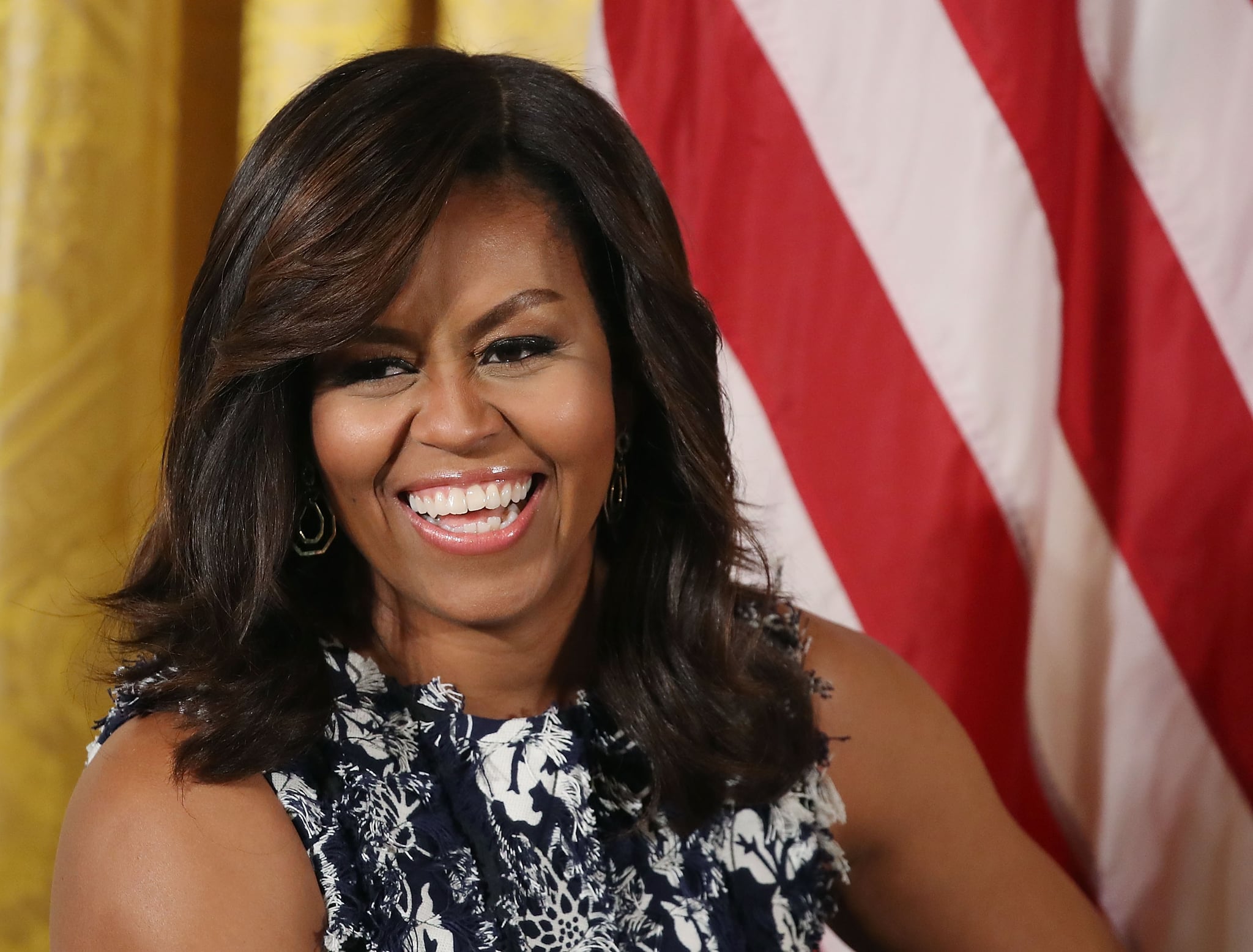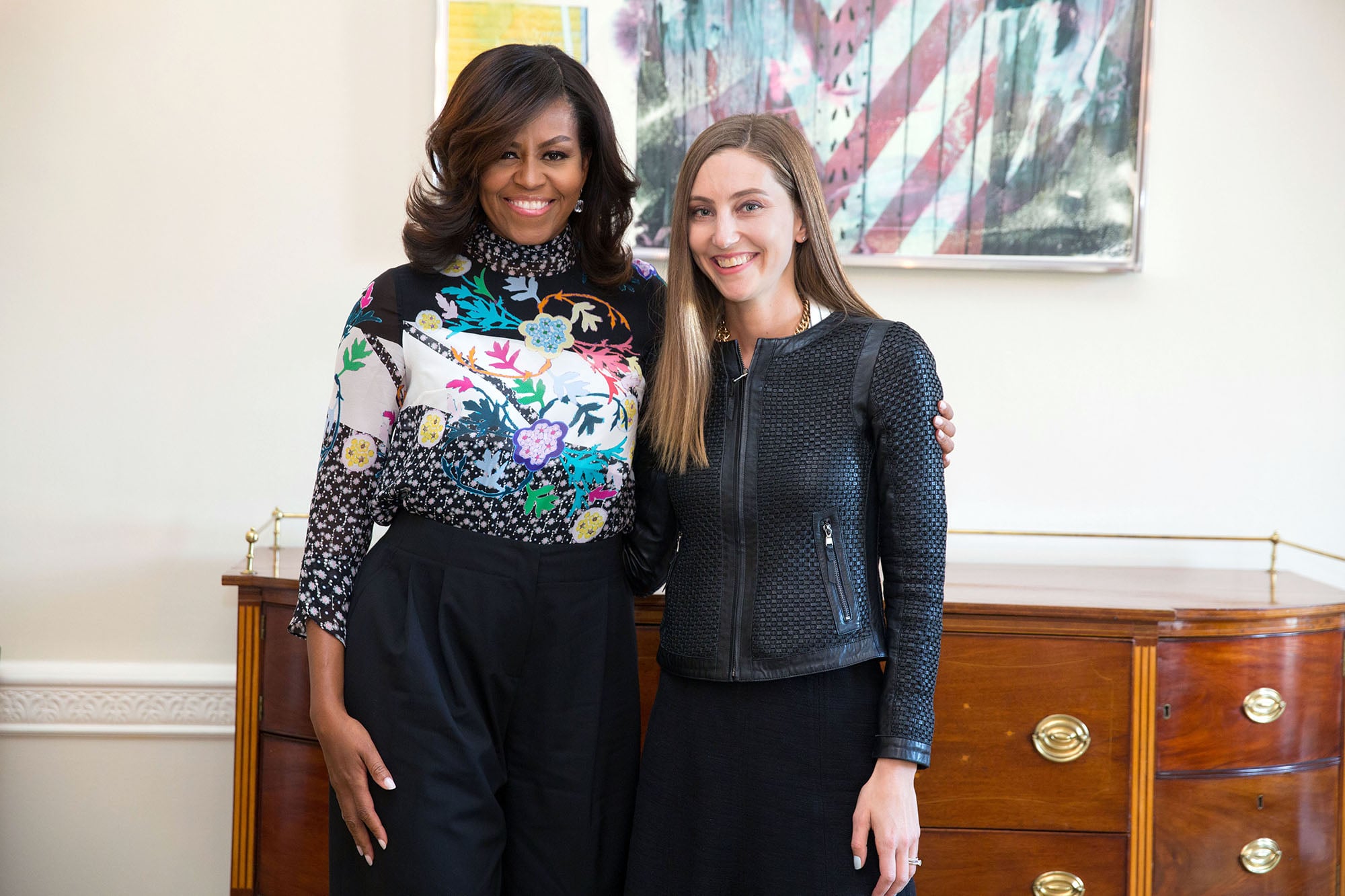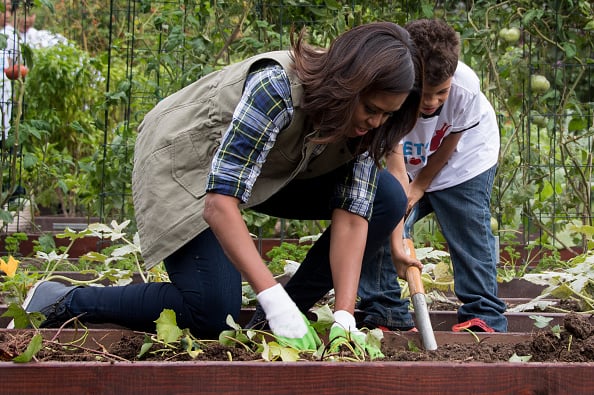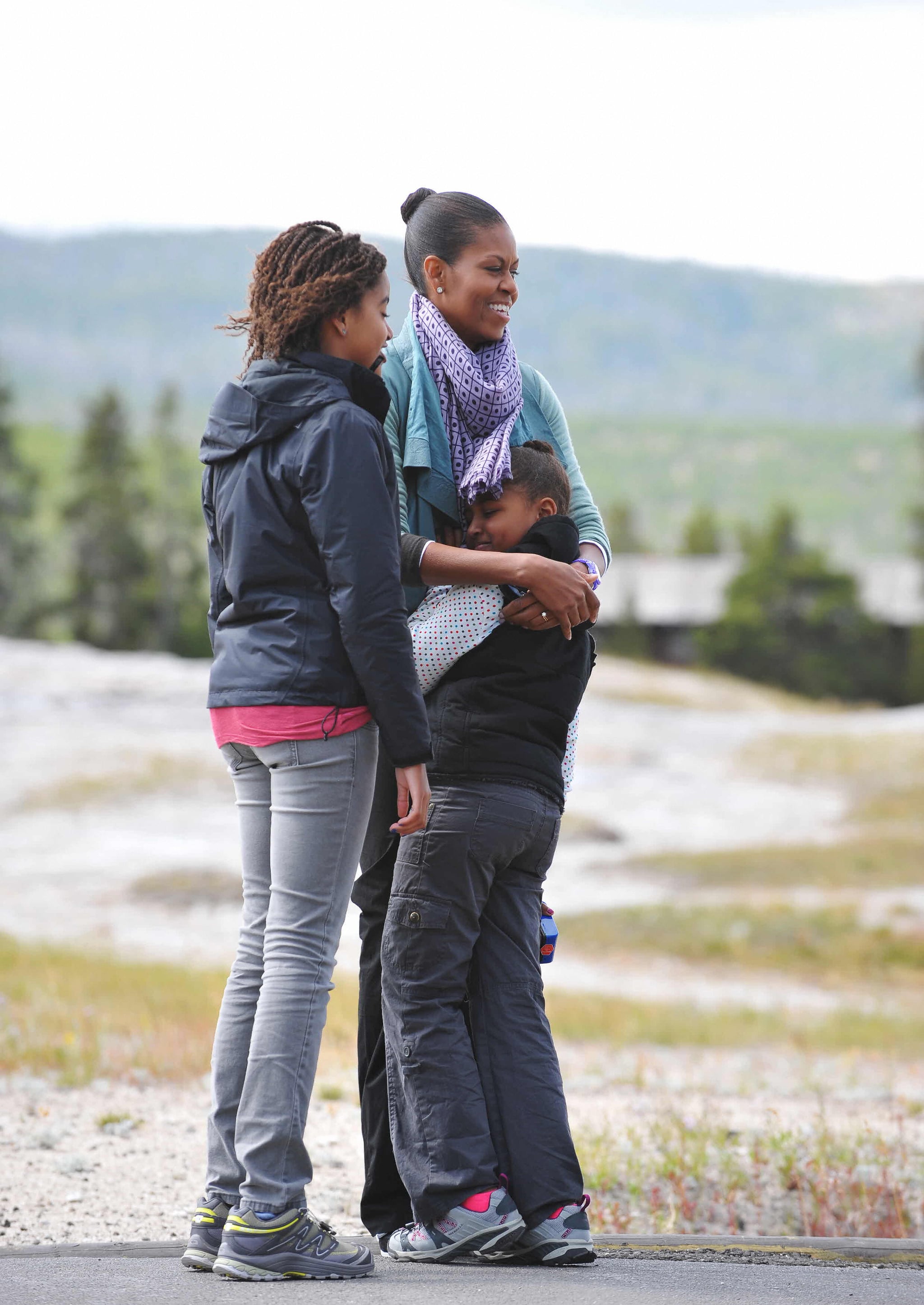Here's the thing about meeting Michelle Obama: you feel like you already know her. IRL, the first lady strikes that perfect balance of personable and polished — just like she does on television.
As she wraps up her historic time as first lady, Michelle is in a reflective mood. This month, she invited a small group of journalists to the White House to discuss her legacy, including her efforts to encourage healthy habits for American kids with Let's Move. During the personal Q&A, shared below, the first lady discussed the accomplishments of Let's Move. As part of her focus on fruits, vegetables, and exercise, Michelle was instrumental in the passing of the Healthy, Hunger-Free Kids Act in 2010, and thanks to Let's Move, two million children have access to salad bars in their schools. Today, childhood obesity rates are leveling off after years of rising.
IRL, the first lady strikes that perfect balance of personable and polished.The round-table discussion took place in the White House's Old Family Dining Room, which Michelle recently redecorated to include modern art. We were ushered through the White House, first getting to meet the impossibly fluffy Bo and Sunny Obama outside. (They are so well behaved and chilled-out, I wondered if they were even real!) Walking through the halls hung with iconic portraits of Presidents John F. Kennedy and George Washington, I had to remind myself that, no, this wasn't a TV set. After watching so many episodes of Scandal and House of Cards, I had the feeling I'd been there before. The White House is a symbol of America first and foremost, but it's also a working office and home. Seeing staffers file in and out of side doors and service entrances brought it to life.
To help calm our nerves when we got to the Old Family Dining Room, Let's Move Executive Director Debra Eschmeyer led us eight journalists in a "vegetable dance" she uses with kids. It included bending over like a root vegetable and then slowly standing tall like a bean stalk. I felt pretty ridiculous jumping up and down in a room Jacqueline Kennedy used to dine in, but hey, I needed to relax before Michelle Obama walked through the door. Luckily, the first lady did not arrive when we were mid-dance.
As soon as the hour-long conversation kicked off, it was clear that Michelle wanted to have a frank conversation. She opened up about her guilty pleasure (pizza, obviously), explained the real reason she goes on talk shows, and even called her daughters' DIY pottery ugly. But isn't everybody's?
Ahead, read highlights from our Q&A round-table.
What do you envision as your legacy, as you think about the White House Kitchen Garden, Let's Move, and other programs you've implemented as the first lady?
Michelle Obama: I hope the garden is going to be around for a long time. It's an important symbol of the progress we've made around changing what we eat and feed our kids. We intentionally put the garden in a place visitors could see it, so that you wouldn't have to be exclusively invited to the White House and have access to the South Lawn to be able to experience the garden. Visitors can come right to the gate and they can see it right there.
I hope the legacy will be that it continues to flourish; that the harvests continue to be used to feed our neighbors; that it becomes, as I said, a symbol for where we want to see the country going. And I hope that every first family builds on it.
Gardening has increased, community gardens have increased significantly. There are 50 percent more community gardens right here in Washington DC. We embarked on this wonderful tour around the country to visit all these new community gardens that have popped up, and hearing the stories of how this one little garden inspired so much — hopefully it won't stop here.
What will be the lasting image of your time as first lady?
MO: It will probably be me doing push-ups, sit-ups. It will be me in some physical form dancing, jumping, laughing, surrounded by kids. What we've tried to do in every initiative, but particularly with Let's Move, is have a lot of laughter, a lot of fun. Fruits and vegetables for some kids are scary and not fun. It's just the opposite of what we want them to think, so that's why we bring in theSesame Street characters. We will push "Billy on the Street" in a cart. A lot of it is to bring joy around the ideas so this doesn't have to be a punishment, it doesn't have to be a burden. It should be fun introducing kids to fruits and vegetables. If you start young, it will be something that they'll attach to really quickly.
Michelle had some fun with Billy on the Street and Big Bird in 2015.
After you leave, do you think you'll still be out there, in front of the public, doing those appearances? Or are you looking forward to a break?
MO: I'll take a little break in the short term. Some of the first questions I got coming in was, "What kind of first lady will you be?" And we got those questions even before we won the election. Part of what I said, which I think is true as we exit, is that I have to see what the platform looks like, what it feels like, what are the spaces out there I can uniquely inhabit? My goal has always been to add value, not to be redundant, not to get in the way, but to do things that lift and move things forward in a very strategic and objective way so that there are real outcomes.
"We always know why we do Ellenand the message points we're trying to get out."I never go on a show just to hang out with Ellen, although I love Ellen — and I would love to just hang out with her. We always know why we do Ellen and the message points we're trying to get out. The fun part is just the hook, but if you really listen to all the appearances, if you follow closely, there's an underlying message and it's powerful how it actually resonates, even through the jokes.
What can mothers and women do to make sure we're taking care of ourselves?
MO: I always encourage people to start in their own personal universe, because sometimes we as parents start thinking about the big picture. How do I change what's happening in my entire school? And how do I do it in my community? And then you get overwhelmed and it's just like, "Forget it, I'll just stay here in my kitchen and wait." But, start small.
Start, as parents, with yourselves, number one. Because we're our kids' first and best role models. So the first question is, what are you as a mom or a dad doing every day, or every week, to start getting into the good habits?
"The first (boot camp weekend) was really hard and I left out all snacks and no wine. My friends were like, 'not coming back.' So I had to add the wine back in."One of the things I've done personally is bring my girlfriends into my health and fitness journeys. I have a group of friends and once a quarter, we come together for three or four days. We're actually leaving tomorrow, and we do what I call a boot camp. And we bring in folks, and we have workouts and we have healthy food and we laugh. The first one was really hard and I left out all snacks and no wine. My friends were like, "not coming back." So I had to add the wine back in. That enticed a few more back.
I want to talk about it more when I leave here. How do we start these communities of support for one another? How do we create these social groups of fitness and exercise? Because we like to communicate with each other, we want a little gossip, we want parenting tips that go on along with that. We start with our own lives and slowly, if we really are committed to it, it expands in ways that you don't even imagine.
How do we avoid rewarding ourselves and our children with unhealthy food?
MO: We're seeing changes in what your options are when you go out, healthy options. When my kids were little and we would go through the happy meal stage, I realized they just wanted the toy. They wanted the experience. They didn't even finish it. You're like, "Finish that, finish it." It was really the experience, and it wasn't the content of the meal; it was the joy of being with you.
You can take them anywhere. It could be going to a nice place and getting a salad. I mean, it sounds crazy, but it doesn't matter. We make ice cream exciting. It's the parents, because usually after a game we're tired and we're looking forward to having some ice cream. You can take them to a movie or to play putt-putt golf.
So much of what we do with our kids is social and that's good, and we shouldn't stop all that. I mean, how boring would it be that, no, we can't eat anything out so we're just going to go home and sit in the closet and wait to the next day.
That's where you just have to get creative. There are all these trampoline parks and there's bowling and there's roller skating. It could be going and making pottery together. There are so many of these little shops . . . . I'm trolling through the recesses of my mind for the things I did with my kids when they used to like to do things with me. They don't want to be around me now. I look back on these times — all those little funny pottery dishes that you'd pay for, and they'd paint, and they were ugly, and you glazed them, and you'd go back, pick them up, and it's like, "Oh, now I've got to put this on my desk." There's all that kind of stuff.
"I found myself really enjoying that Chuck-E-Cheese pizza."You know, I found myself really enjoying that Chuck-E-Cheese pizza. And that pizza is a little . . . it's not the best pizza. I was like, birthday party at Chuck-E-Cheese!! And the kids would be playing. You have to calm them down to eat, and we're the ones eating.
Do you have any plans to encourage women to live healthier lives and increase body positivity?
MO: I'm very interested in that. That's all I can say. And the question is how and why and what? We've had these conversations. Because we focused on kids for a reason. When you're in a political environment, you kind of know the pitfalls of when you start addressing these kind of conversations to adults. It's hard to change adults, and it's hard to change it from a political position or a perceived political position.
Kids, everybody can get behind. It's a bipartisan thing. We care about our kids' health. But the truth is, it's very important for us to talk to parents, in particular mothers, because it's really our self-esteem, it's our initiative.
You look at all the sporting companies out there. I won't name names, but we know who they are. Good brands and logos and things like that, and they have to start catering to real women. Even in how their sports apparel is designed, and the commercials — you want to look at a commercial and see yourself. Not everybody is going to run a marathon or do a triathlon. It's not necessary to do that to be in good health. But what are the conversations that we have about the visuals that we put out there that speak to us as women and women of all sizes and abilities?
No matter what Michelle Obama does next, we're sure she'll make a difference.












